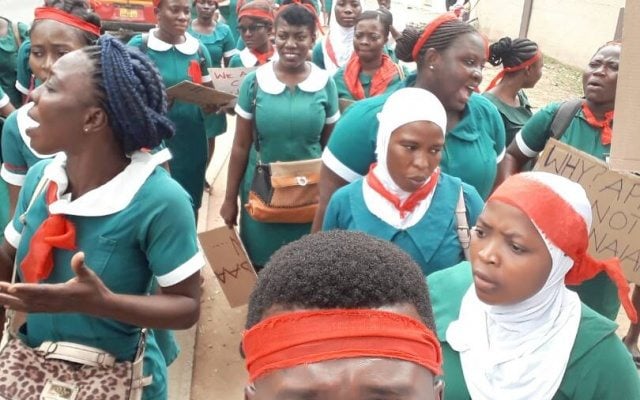The Ghana Registered Nurses and Midwives Association (GRNMA) stands at a critical juncture in its pursuit of improved working conditions. After postponing strike action earlier this month based on assurances from Parliament’s Health Committee, the GRNMA now faces another delay, pushing the crucial meeting to July 10th. This postponement, attributed to the absence of both the Health and Finance Ministers, has sparked frustration within the GRNMA, raising concerns about the government’s commitment to addressing their concerns. The Association has explicitly warned that further delays will not be tolerated, setting the stage for potential escalation if a satisfactory resolution is not reached in the upcoming meeting. The GRNMA’s patience is wearing thin, and the July 10th meeting looms as a decisive moment in this ongoing struggle.
The core issue at stake is the implementation of the GRNMA’s revised conditions of service, a matter that has been subject to protracted negotiations and delays. The Association argues that these improved conditions are essential for retaining qualified nurses and midwives within Ghana’s healthcare system, ultimately benefiting the quality of care provided to the public. The GRNMA’s willingness to suspend strike action demonstrated a commitment to dialogue and a belief in the parliamentary process. However, the recent postponement, coupled with what the GRNMA perceives as a lack of timely communication, has eroded their trust and fueled anxieties about the government’s genuine commitment to resolving the issue. The Association’s leadership has emphasized the need for concrete timelines and actionable plans, not mere promises, at the rescheduled meeting.
The GRNMA’s Vice President, Samuel Alagkora Akologo, expressed deep disappointment at the last-minute notification of the postponement, questioning the seriousness with which their concerns are being treated. He highlighted the two-week period leading up to the originally scheduled meeting, during which ample time existed to communicate the ministers’ unavailability. This lack of proactive communication has fueled suspicion within the GRNMA that the July 10th date might also be subject to change. Akologo’s pointed remarks underscore the Association’s growing distrust and the urgency they attach to this matter. The GRNMA has clearly signaled that their patience is not infinite and that further delays will be met with decisive action.
The Chairman of Parliament’s Health Committee, Dr. Mark Kurt Nawaane, has sought to allay the GRNMA’s concerns, attributing the postponement to the unavoidable absence of the key ministers and emphasizing that it was not a sign of disregard for the nurses’ concerns. He reiterated the Committee’s commitment to advocating for the GRNMA’s cause and assured them that Parliament remains dedicated to finding a resolution. While Dr. Nawaane’s assurances are intended to calm the situation, the GRNMA remains skeptical, having experienced previous setbacks and delays. Their focus is now squarely on the July 10th meeting, where they expect concrete actions and timelines, not just reassurances.
The July 10th meeting now carries significant weight, representing a pivotal moment in the ongoing negotiations. For the GRNMA, this meeting is not just about dialogue; it’s about tangible outcomes. They expect to receive clear answers regarding the implementation of their revised conditions of service, including specific timelines and mechanisms for implementation. Anything short of this will likely be interpreted as a lack of commitment on the government’s part and could trigger a resurgence of strike action. The GRNMA’s leadership has made it unequivocally clear: they seek results, not excuses. The pressure is now on the government to demonstrate its commitment to addressing the nurses’ concerns and avert a potential crisis in the healthcare sector.
The underlying tension in this situation reflects a broader challenge within Ghana’s healthcare system: balancing the needs of healthcare professionals with the constraints of public resources. The GRNMA argues that investing in their workforce is essential for providing quality care and retaining skilled professionals. The government, while acknowledging the importance of a well-functioning healthcare system, must also grapple with budgetary limitations and competing demands. Finding a sustainable solution that addresses the GRNMA’s concerns without jeopardizing other critical areas of public spending will require careful negotiation and a commitment to finding common ground. The July 10th meeting will be a critical test of the government’s willingness to prioritize the needs of its healthcare workers and invest in a stronger, more sustainable healthcare system. The outcome of this meeting will have far-reaching consequences for both the GRNMA and the future of healthcare in Ghana.


